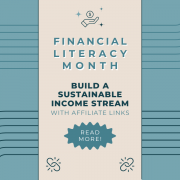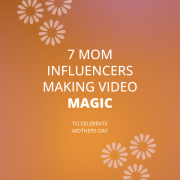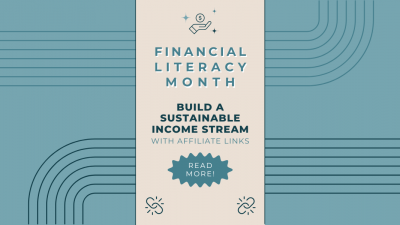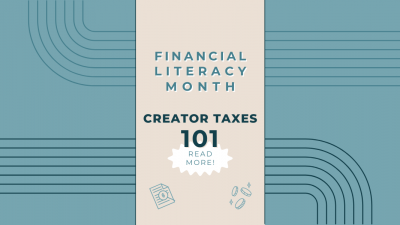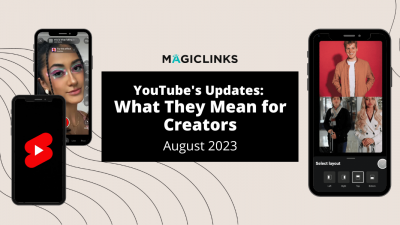Happy Financial Literacy Month! April is dedicated to raising awareness about financial education and empowerment. All month long catch us covering essential topics like creator taxes, affiliate monetization strategies, and setting solid financial goals to help you scale your creator business and make strong financial decisions.
What’s Inside:
01 Setting Financial Goals
02 Keeping Your Finances Organized
03 Reading The Fine Print
04 Saving Smarter, Not Harder
05 Treat Yo Self
Setting Financial Goals
The first step to creator money management is to establish short-term and long-term goals. Wanting to upgrade to the hottest, new vlogging camera? Depending on the price of the camera, that could fall into the short term category. Goals like building an emergency fund, saving for a down payment on a house, etc. would be considered long term. It’s important to have a healthy balance between the two.
A common goal setting method is following the SMART goals framework. SMART is an acronym that stands for Specific, Measurable, Achievable, Relevant, and Time-Bound. These are great things to think about when you set out to achieve new objectives. Establishing SMART goals can provide you with clarity, motivation, and accountability for reaching your targets in a strategic way. This method can be used in all types of situations and isn’t bound to the topic of finance. An example of a SMART financial goal would be:
- Specific: I need to buy a new laptop within the next 6 months.
- Measurable: The laptop is roughly $3000 dollars (the amount can be easily tracked).
- Achievable: With my current income and expenses, this goal is realistic.
- Relevant: This goal aligns with my need to have a faster and higher equipped laptop to edit my content.
- Time-Bound: I have given myself a deadline of 6 months to achieve this goal.
Keeping Your Finances Organized
As a business, you should keep your personal and business accounts separate. Not only does this paint a clear picture of your cash flow as a business, it also provides legal protection. Your business account would be used to manage payments you receive from brands, payments to management or assistants that you may have, business taxes, etc. Regarding legal protection, having separate accounts establishes a clear line between personal funds and funds for your business. This can protect your personal assets from liability risks or lawsuits.
Separate accounts also ensure that you are accurately reporting business cash flow for tax filing purposes. Maintaining a business account makes it easier to report your income and any possible deductions for your tax return. It also allows you to monitor your spending more accurately and can help you make informed decisions on your business needs and profitability.
Reading The Fine Print
Take time to read the details of affiliate programs, sponsorship contracts, etc. The urge to automatically select ‘agree’ to the Terms and Conditions checkbox may be strong but you must do your due diligence in understanding what you are signing up for. Get to know the terms, rates, and payment schedule associated with each opportunity. As creators, we understand the importance of consistently partnering with brands in order to make money. With all things considered, take your time in making these decisions. Rushing into a contract without proper research can be detrimental.
Most importantly, as a public figure, you have a slightly elevated risk of being a target of fraud. Be sure to properly vet those who reach out about sponsorship opportunities. Some common scams could be someone impersonating a legitimate account or brand (for example: employee.magiclinks@gmail.com ❌ vs. marketing@magiclinks.com ✅), being asked for payment for sponsorship opportunities, an “urgent” message threatening legal action unless they receive payment for an alleged “copyright infringement”, or any suspicious links being sent. Lastly, make sure to regularly monitor your accounts and credit reports to stay informed on any inaccuracies.
Saving Smarter, Not Harder
Life can be unpredictable so it is important to have an emergency fund for those unexpected expenses and those slower content months. The standard rule of thumb for an emergency fund is to have a minimum of 3-6 months worth of expenses at your ready. However, there is no one-size-fits-all answer to how much you should keep. At MagicLinks, we value transparency and realness. We understand that it can be hard to save in this day and age and upwards to 44% of Americans have less than $1000 in savings. Just do what you can and don’t be too hard on yourself.
Savings accounts are vital in achieving short-term goals (like travel for networking opportunities) and long-term goals (saving for retirement). When searching for a savings account, a great option could be an HYSA (High Yield Savings Account). HYSAs offer much higher interest rates compared to traditional savings accounts. For example, a traditional account may have an interest rate of 0.1% – .25% vs. an HYSA with 4% – 4.5%. Be sure to cross compare the banks with the most competitive interest rates to maximize your growth.

Having an emergency fund further drives the point of keeping business and personal finances separate. The last thing you want is for your “rainy day” fund to be garnered for business purposes.
Treat Yo Self!
You only have one life to live so you should enjoy it! It’s perfectly OK to treat yourself every now and again. Try not to feel guilty when you purchase that jacket you’ve been eyeing for months or ordered some Uber Eats because you were craving a little sweet treat😋 Ideally, you’ve handled your obligations and are using extra income that you’ve set aside. Remember, finding that balance between wants and needs is the key to living a fulfilling life. Plus, planning a pampering day could double as content!

